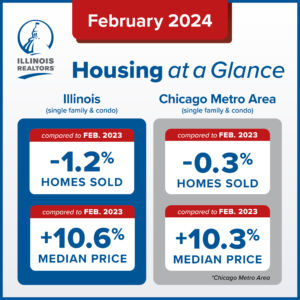A slower housing market doesn’t have to mean less business. Here are eight ways to stay competitive.
After several years of strong sales and median price gains, the Illinois housing market has gotten off to a slower start this year.
Through the first four months of the year, many parts of the state saw year-over-year declines in sales. Median prices, while still stable, have fallen below the pace seen in previous years.
Of course, these numbers aren’t anywhere close to reflecting the recessionary levels seen a decade ago, but they may indicate REALTORS® are having to work harder – and smarter – to keep their edge.
“Someone in our office called the current market ‘Groundhog Day,’ because it sticks its head out of the ground, stays active for a little while, and then goes back down into its hole,” says Kim Kerbis, vice president of brokerages for @properties in Chicago.
“There’s just no consistent trend-line at this point. One week, agents are talking about multiple offers, and then the next one feels pretty sleepy and you’re wondering where everyone went.”
As any real estate professional who weathered the last housing downturn can attest, this fluctuating activity – and other telltale signs –could signify a cooler market on the horizon, but this is not the time to bury your head in the sand and hope that business stays good.
Instead, it’s time to hone your marketing approach, redeploy some real estate basics, dial in your advertising strategies, review your finances and tweak your budget in anticipation of a cooler market for the rest of the year (and possibly into 2020).
Here are eight things you can do right now to keep your business pipeline strong and commission checks coming during any market conditions:

Kim Kerbis
Vice president
of brokerages for @properties in Chicago
Pay attention to market conditions (and the issues that impact them)
Even if you’ve had your head down for the last few years, working more deals than ever, it’s time to take a short breather and catch up on what’s going on in the market around you.
Kerbis tells agents to pay attention to political developments on the local, state and national levels, all of which can impact the home-selling market.
“We shouldn’t be working in a bubble,” she said. “We have to know what is going on at both the micro and macro level in order to best serve our clients.”
Political and policy changes can bring consumer uncertainty. Chicago has a new mayor, the state of Illinois has a new governor and there is political divisiveness at the national level and those factors can affect confidence in the market, she says.
Get back to basics now
When business is robust, we all tend to forget about the basic steps that we could be taking in order to keep our client pipelines full. Then economic downturns and recessions hit, and we’re all scrambling to get back to basics.
For example, Kerbis says too many agents and brokers are using generic voicemail greetings (e.g., the automated “please leave a message for [your number here]); not including complete signatures on their email messages; and forgetting about other inexpensive marketing tactics.
“There’s some low-hanging fruit that agents could be using for branding and marketing,” says Kerbis. “Simply having your voice on your outgoing voice message can go a long way in creating a more personal experience for your clients. It also helps reinforce your brand.”
Most important, getting back to the basics isn’t expensive.
She also tells agents to develop “proper” email signatures – both for your laptop/desktop email and for the emails you send from your mobile phone – that include your name, company name, office address, mobile number and website.
“I still get emails from agents with ‘sent from my iPhone’ as the signature so I couldn’t even call them back if I wanted to,” she said.

Justin Letheby Broker/trainer at Berkshire Hathaway HomeServices Starck Real Estate in
St. Charles
Double-up on the advertising that works
When business is brisk, it’s easy to sign up for the “latest and greatest” shiny objects without really knowing whether they’re producing business for you.
Justin Letheby, broker/trainer at Berkshire Hathaway HomeServices Starck Real Estate in St. Charles, says now is a good time to give those investments a second look to see if they’re truly paying off.
“Find out what’s giving you the biggest bang for your buck, and get rid of anything that’s not,” Letheby suggests.
For example, he says over the last few years a lot of agents have “had fun playing in the world of Facebook and trying to build ads on the platform.”
A self-proclaimed advocate of social media advertising, Letheby says the agent that is just starting to use the platform – and without any positive results – should probably take a break from it and double up on advertising strategies that are working.
That stated, you have to market.
“This not the time to stop spending on advertising and marketing,” says Andrea Geller, broker-associate for The Chaz Walters Group at Coldwell Banker Residential Brokerage in Chicago.
She tells other agents to develop a balanced approach that incorporates a mix of face-to-face, offline, and digital strategies – all of which should be centered on your brand.
“If you aren’t top of mind for your clients, and if you’re not branding yourself in their minds then you won’t get an effective return on your investment in any market conditions,” says Geller.

John Lawrence
Managing broker at Berkshire Hathaway HomeServices KoenigRubloff Realty Group
in Oak Park
Ask for the business
When times are good, it seems like agents can pick up a rock and find a group of pre-approved buyers huddled under it, ready to buy.
When market conditions turn, actually getting out there and asking for the business becomes one of the most important things you can do as an agent.
“When the market is hot, the assumption is that people are just going to reach out to you on their own volition,” says John Lawrence, managing broker at Berkshire Hathaway HomeServices KoenigRubloff Realty Group in Oak Park. “That changes when the market cools off.”
To prepare now, Lawrence tells agents to get more active and engaged in their communities, organizations, non-profit groups, schools and other places where you can create relationships and, subsequently, ask for the business.
“People want to do business with professionals who are involved and giving back to their communities,” he says.
To ensure that your sphere of influence knows you’re available in a professional capacity – but not hounding them – Lawrence says agents should strive to become a valuable resource for those individuals. That could mean telling them about a reliable, affordable handyman that you’ve worked with, or sharing some email tips on the Top 10 Ways to Prep Your Pool for the Summer.
“Show value, help your sphere fulfill its needs,” he says, “and then ask for the business.”
Use the 33-touch rule
Knowing that a cooler real estate market could prompt agents and brokers to rein in their marketing budgets, Kerbis tells REALTORS® to stick to the 33-touch rule.
This rule states all real estate professionals should be connecting with clients at least 33 times a year (whether those clients are actively buying or selling, or not).
Kerbis says Pride Week, Rosh Hashanah, Christmas and International Women’s Day all present great opportunities to let prospects know that you’re thinking about them.
@properties, for example, uses built-in “e-announcements” that agents can set up within a few minutes. On the first-year anniversary of a buyer’s closing date (i.e., their “home anniversary), for example, reach out to say hello, see how they’re doing, and ask if they need help with anything.
For an even bigger impact, take the time to send those cards via snail mail.
“There’s nothing better than getting an actual live note these days, because no one gets them anymore,” says Kerbis.

Andrea Geller
Broker-associate for The Chaz Walters Group at Coldwell Banker Residential Brokerage in Chicago
Use data to manage seller expectations
When the housing market takes a dip, sellers can be confused about why their homes aren’t selling, or why they’re not selling for the prices they expected.
Letheby says MLS data can really prove its worth in these situations, particularly when homeowners don’t understand why they have to drop their asking price or accept a lower-than-anticipated offer.
“The MLS data and reports can help you show the numbers and better explain market conditions – right in black and white,” Letheby says.
For example, an increase in a month’s supply of available housing indicates a shift away from a seller’s market and can impact current market pricing.
“Look at the numbers and then help your clients interpret them in a way that makes the most sense to them,” he said.
Shore up your finances
When the market starts to show signs of turning, Letheby says he starts to save 5 percent of every commission check in a side savings account. That way, if business does wane, he has cash reserves to tap into.
“I want to be able to weather the storm and not be caught without extra cash when I’m in between deals,” he says.
Another way to shore up your finances is by branching out. A broker might consider adding property management or rental properties to a menu of offerings.
“If someone is solely a listing agent, maybe he or she needs to start looking at renters as a way to earn some extra income,” Letheby says. “That can help you open up your business avenues a bit and shield you financially in case your regular lines of business start to dwindle.”
Now is the time to work harder and smarter
To agents who might be concerned about business fluctuations in their own markets, Lawrence says now is the time to just get out there and keep working, knowing that there are still plenty of transactions taking place in most markets throughout the state.
“These deals may be taking a little bit longer to close, but the agents that are marketing themselves, working hard and operating with a positive attitude are doing fine,” says Lawrence.
“Those of us who made it through the recession did it by staying on top of the numbers and being creative,” Lawrence continues. “We all have to work harder sometimes to make the same amount of money. If you want to be successful, that’s what you’re going to have to do.”
About the writer: Bridget McCrea is a business, real estate and technology writer in Miami, Fla.
She can be reached at [email protected]




 Create professional development programs that help REALTORS® strengthen their businesses.
Create professional development programs that help REALTORS® strengthen their businesses.
 Protect private property rights and promote the value of REALTORS®.
Protect private property rights and promote the value of REALTORS®.
 Advance ethics enforcement programs that increase REALTOR® professionalism.
Advance ethics enforcement programs that increase REALTOR® professionalism.
 Protect REALTORS® by providing legal guidance and education.
Protect REALTORS® by providing legal guidance and education. Stay current on industry issues with daily news from Illinois REALTORS®, network with other professionals, attend a seminar, and keep up with industry trends through events throughout the year.
Stay current on industry issues with daily news from Illinois REALTORS®, network with other professionals, attend a seminar, and keep up with industry trends through events throughout the year.







